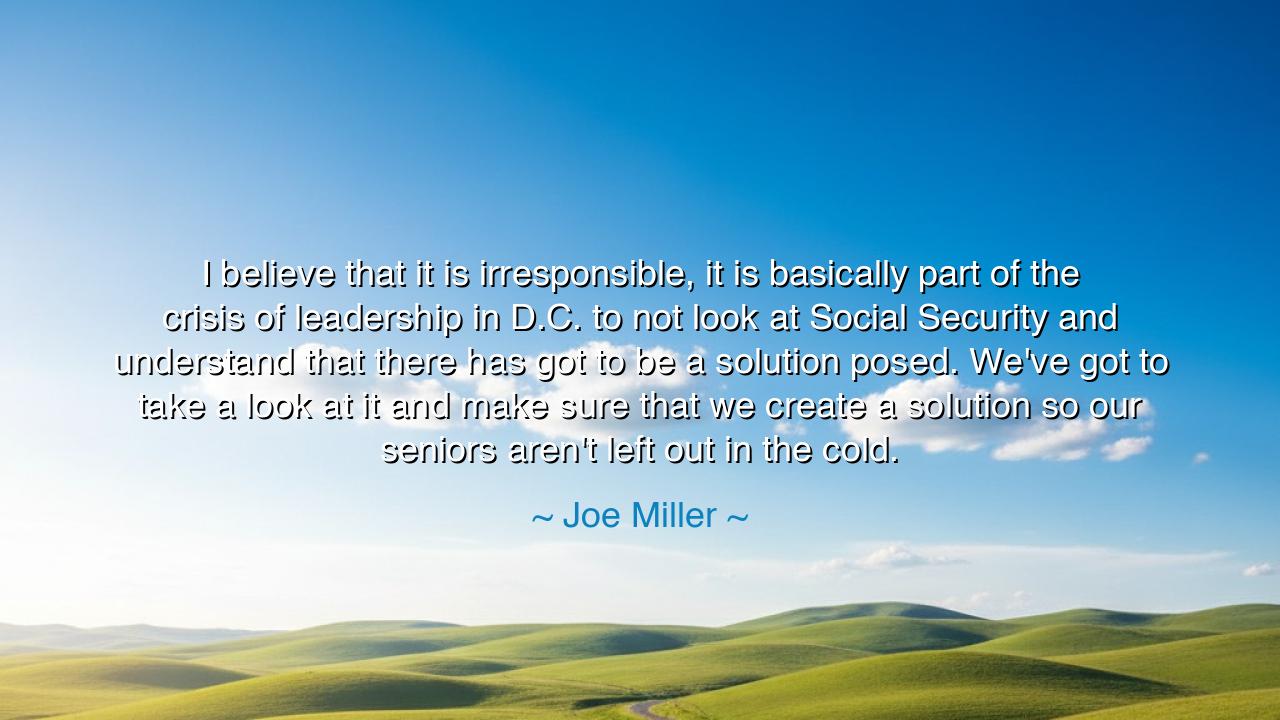
I believe that it is irresponsible, it is basically part of the
I believe that it is irresponsible, it is basically part of the crisis of leadership in D.C. to not look at Social Security and understand that there has got to be a solution posed. We've got to take a look at it and make sure that we create a solution so our seniors aren't left out in the cold.






The words of Joe Miller—“I believe that it is irresponsible, it is basically part of the crisis of leadership in D.C. to not look at Social Security and understand that there has got to be a solution posed. We've got to take a look at it and make sure that we create a solution so our seniors aren't left out in the cold”—speak with the gravity of a man calling his nation back to duty. Beneath his concern for policy lies an ancient and moral truth: leadership is not the privilege of power, but the burden of care. To neglect those who built the world we now inherit is to betray both memory and responsibility. In his words, we hear not only political criticism but a timeless reminder that the measure of civilization is how it treats its elders—the keepers of wisdom, the bearers of sacrifice.
Miller’s warning that inaction is irresponsibility cuts to the heart of leadership’s decay. To look upon a looming problem and turn away is not neutrality—it is cowardice. The ancients understood this deeply. When Cincinnatus was called from his plow to defend Rome, he did not delay or debate; he acted. For leadership, in its truest form, is not about convenience or safety—it is about courage in the face of burden. Miller’s cry that Washington suffers from a crisis of leadership is, therefore, not a condemnation of individuals but of an entire moral condition: a forgetting of duty, a failure to serve the people with foresight and sacrifice.
At the heart of his message lies the defense of Social Security, but his words transcend policy. They are about the sacred trust between generations. The elderly—our parents, our mentors, our ancestors in spirit—gave their labor so that the young might live in stability. When a society abandons them to the cold, it reveals not economic failure but moral bankruptcy. For in every culture that has endured, the elders have been honored, their dignity preserved even as their strength waned. To provide for them is not charity—it is justice, the repayment of a debt owed by every generation to those who came before.
Consider the story of King Lear, who divided his kingdom among his children, trusting that love would protect him in his old age. But greed and pride blinded his heirs, and he was cast out into the storm, his crown traded for betrayal. Lear’s tragedy is the reflection of what Miller warns against: when the young, or the powerful, forget gratitude, the nation itself stands in the storm, stripped of honor. To abandon the elderly is to repeat the sins of Lear’s daughters, and the price, as Shakespeare wrote, is madness and ruin.
Miller’s words also challenge us to see that solutions are not born from fear, but from responsibility. It is not enough to lament the failures of governance; true leaders seek remedies, not excuses. “We’ve got to take a look at it,” he says—not as rhetoric, but as resolve. The first act of healing any wound is to look directly at it, no matter how deep or painful. Whether in politics or personal life, we must not avert our eyes from problems that seem too great. For avoidance is the root of decline; attention is the beginning of renewal.
His concern for our seniors also reflects the Stoic belief that virtue lies in service to others. The philosopher Marcus Aurelius taught that every man is a thread in the tapestry of the common good. If one thread frays, the whole fabric weakens. So too with the social fabric of a nation: when the old are neglected, the young lose their example, and the bond of mutual duty unravels. To sustain that bond is to affirm the unity of past, present, and future—to honor the living chain that makes a people whole.
The lesson, then, is clear and enduring: leadership demands vision, compassion, and courage. One must not govern for the comfort of the moment, but for the welfare of generations. To the leaders of any age—be they rulers, teachers, or parents—Miller’s words are a call to conscience. Do not delay what must be done. Do not turn your face from those who once carried the weight you now bear. For to lead well is to remember always that strength is temporary, but responsibility is eternal.
Thus, let these words echo beyond the chambers of politics: a nation that tends to its elders, that faces its challenges with honesty and resolve, is a nation that honors its soul. And a people that live by duty rather than denial will never be left out in the cold.






AAdministratorAdministrator
Welcome, honored guests. Please leave a comment, we will respond soon